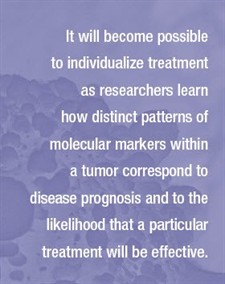For now, the only possible route to outliving pancreas cancer is complete removal of the tumor via surgery. Surgery for pancreas cancer is long and demanding, and surgeons must be practiced to consistently perform it well. Pancreas cancer surgery outcomes are better at high-volume, major medical centers such as UCSF, where surgeons can specialize - perfecting and maintaining skills and deepening their experience and judgment.
UCSF surgeons Kimberly Kirkwood, M.D., and Eric Nakakura, M.D., Ph.D., remove a large number of pancreas tumors each year. They generally achieve excellent outcomes for standard procedures, but they also perform operations rarely offered elsewhere for certain patients who otherwise would not meet criteria for surgical treatment.
For the most common type of pancreas cancer, called adenocarcinoma, surgery to remove tumors is the best option for cases discovered at an early stage, when the tumor is confined to the pancreas. Kirkwood notes that nationwide, about 20 percent of patients treated with surgery, followed by additional therapy, survive five years or more. At UCSF, that figure approaches 40 percent.
But shockingly, research by UCSF epidemiologist and Pancreas Cancer Program member Elizabeth Holly, Ph.D., reveals that physicians in California fail to refer more than one-third of eligible early-stage patients for surgery, leading to inevitable and unnecessarily early deaths for many. In other US studies, researchers have found similar results.
Not all physicians are aware that surgical techniques and outcomes have improved, Kirkwood suggests. Even for the most extensive procedures, involving reconstruction of major blood vessels, the risk of death due to surgical complications now is 3 percent or less at UCSF and other high-volume, major medical centers where surgeons are similarly experienced, she says.
Kirkwood and Nakakura do more than take out tumors. Both surgeons are integral members of coordinated care teams. They work closely with medical oncologists, pathologists, radiologists, gastroenterologists, nutritionists, nurses and other caregivers to meet the complex diagnostic and treatment needs of pancreas cancer patients. For instance, Kirkwood's well-rounded research activities include three projects aimed at improving the quality of life of patients, regardless of their prognosis for survival.
Nakakura and Kirkwood also work with colleagues on research directed at improving survival and cure rates. They evaluate new protocols for treatment before, during and after surgery - and for cases in which surgery is not yet an option.
Even when tumors cannot be removed, there is hope for experimental drugs and for marketed drugs that have not yet been tested in pancreas cancer. The need for better drug treatment is great. "We now know that these tumors are heterogeneous," Kirkwood explains. "This may explain why a particular drug may work well in one patient, but not in others."
 Researchers are trying to identify molecular
biomarkers within tumors that provide clues. These investigations
require not only tumor tissue, but also a good clinical records
database to allow for comparison and analysis of tumor
characteristics, treatment and treatment outcomes. It will become
possible to individualize treatment as researchers learn how
distinct patterns of molecular markers within a tumor correspond to
disease prognosis and to the likelihood that a particular treatment
will be effective. Physicians will be able to match each patient
with what is likely to be the best available treatment.
Researchers are trying to identify molecular
biomarkers within tumors that provide clues. These investigations
require not only tumor tissue, but also a good clinical records
database to allow for comparison and analysis of tumor
characteristics, treatment and treatment outcomes. It will become
possible to individualize treatment as researchers learn how
distinct patterns of molecular markers within a tumor correspond to
disease prognosis and to the likelihood that a particular treatment
will be effective. Physicians will be able to match each patient
with what is likely to be the best available treatment.
Nakakura has a special interest in finding ways to improve outcomes for patients with another type of pancreas tumor. His focus is on neuroendocrine tumors of the pancreas and intestines.
Neuroendocrine tumors frequently metastasize and may produce hormones, which cause debilitating symptoms. Nakakura notes that the incidence of these cancers has been increasing over the past few decades. Unfortunately, he adds, the odds of survival have not improved, and there are no effective treatments for patients with advanced disease.
Unlike patients with pancreatic adenocarcinomas that have grown beyond the pancreas, some carefully selected patients with advanced neuroendocrine tumors may benefit from surgery to palliate symptoms and possibly extend survival.
Nakakura has been collaborating with laboratory scientist Douglas Hanahan, Ph.D. who has genetically engineered strains of lab mice so that they develop pancreatic neuroendocrine tumors - and with medical oncologist Emily Bergsland, M.D. Their studies have led to a new clinical trial at UCSF headed by Bergsland to evaluate for the first time two new therapies that specifically target biochemical events important for the growth of neuroendocrine tumors.
"We're trying to get to the point where we're giving drugs that we think will work best for particular individuals, based on the characteristics of each patient's tumor," Nakakura says. Again, biomarkers are the key. "We want to see if we can identify molecular features of a patient's tumor that will predict response to treatment."